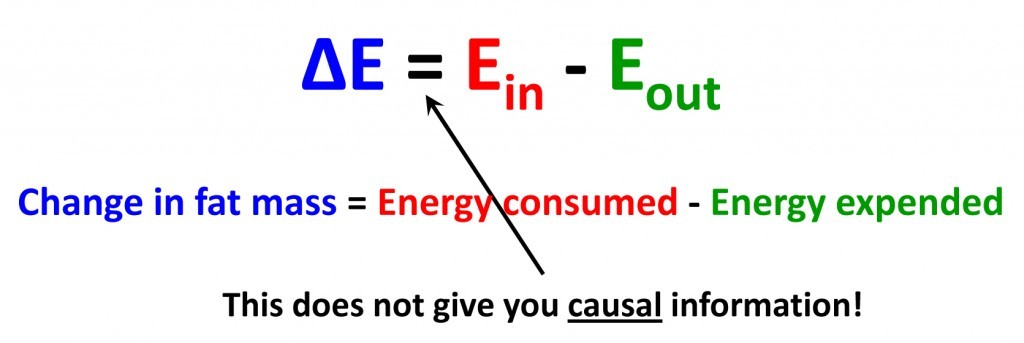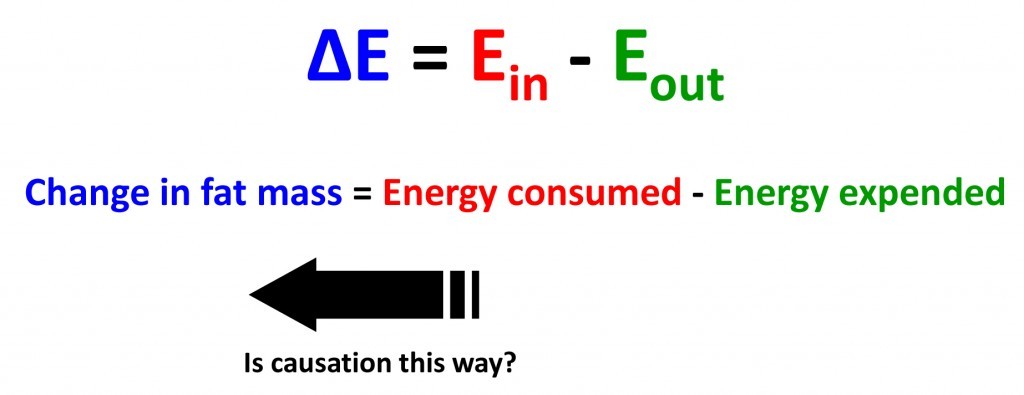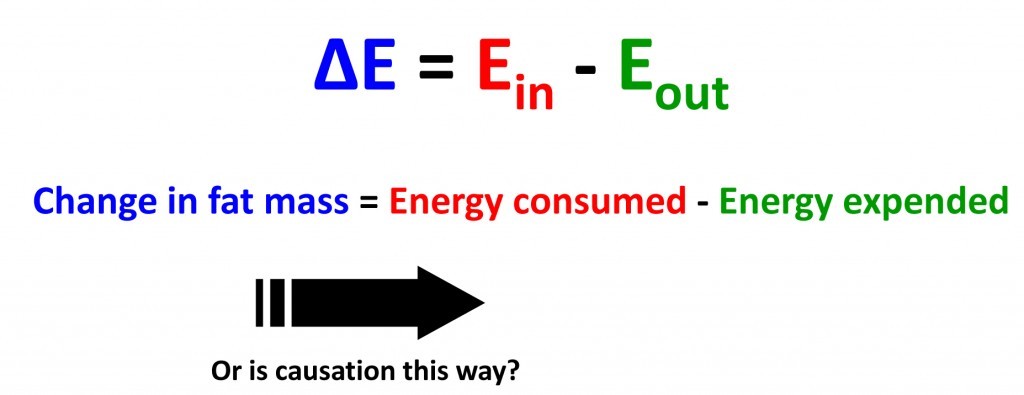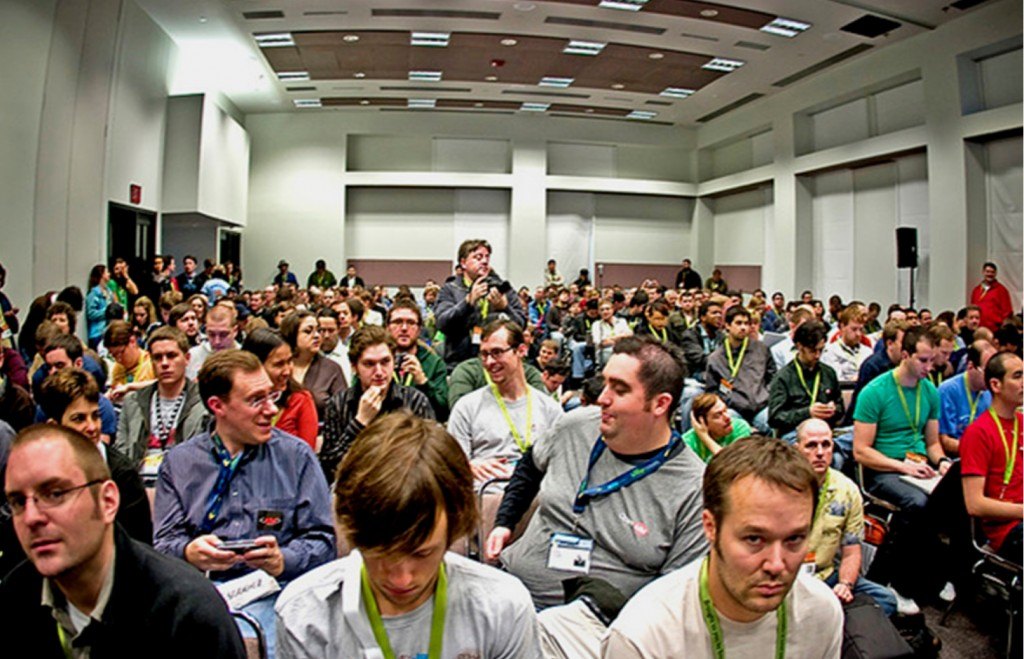I’ve written about obesity (i.e., unregulated horizontal growth) being caused by excess insulin, which in turn leads to overeating and under-moving. This is contrasted with the reverse – overeating causing obesity. Let’s double-click on this idea using one of the most important laws governing our universe – the First Law of Thermodynamics.
Whenever people like me or Gary Taubes or Rob Lustig say, “Calories-in-less-calories-out does not explain obesity,” we’re bombarded by folks screaming, “Hey – you’re violating the First Law of Thermodynamics…,” so let me address this point head on.
Below is the First Law in its simplest form. It states that energy cannot be created or destroyed – that is, the change in energy of a system (blue term) is equal to the energy entering the system (red term) less the energy exiting the system (green term). To make this specific to our question, let me state it this way: the change in fat mass of a person is equal to the difference between the energy consumed and the energy expended.
No one disagrees with this point (except maybe folks who think the world is flat or that the sun rotates around the earth). Here is where the trouble starts…
Most obesity “experts” assume (erroneously) that the big equal sign between the blue and red terms implies a direction of causality. In other words, they assume that an increase in fat mass (the blue side gets bigger), was CAUSED by the red number being bigger than the green number.
So is this the case? Was the increase in fat mass CAUSED by more energy entering the system than leaving the system (i.e., was the gain of fat CAUSED by eating more calories than expending)? If obesity is caused by overeating, the causation arrow points from right to left, as in the figure below.
Or is it the reverse? Was the positive energy balance (more energy entering the system than leaving the system) the RESULT of a change in fat mass? In other words, does the drive to become obese (i.e., the drive to accumulate fat rather than oxidize it) cause over-eating? If this is the case, the causation arrow points from left to right, as in the figure below.
Obviously, I believe the latter over the former, but the point is that neither argument commits the cardinal sin of “violating the First Law of Thermodynamics” as so many people assert when one suggests the “calories-in-less-calories-out-determines-change-in-fat-mass” model is incorrect.
To reiterate, I am not for a moment suggesting that energy balance or thermodynamics are being violated. I’m saying they do not tell you WHY our bodies choose to accumulate fat instead of burn it. A growing child, for example, is consuming more energy than he is expending (which allows him to grow), but this is not the CAUSE of his growth, it’s the RESULT of his growth. A pregnant woman isn’t gaining fat during the pregnancy BECAUSE she is eating more energy than she’s expending. She’s creating a positive energy balance BECAUSE her hormones are driving her to create this energy balance so she can support the fetus.
Let me use one more example I’ll borrow from Gary Taubes to illustrate this subtle distinction. Look at the picture, below, of the crowded room. Let’s explain what’s going on this room in terms of thermodynamics. The First Law would say something like this: The change in the number of people in the room must be equal to the difference between the number of people entering the room and the number of people leaving the room. For example, if the room “gains” 10 people, we can safely conclude that 10 more people entered the room than left it (e.g,. 15 versus 5, or 197 versus 187).
So here’s the million dollar question: Why is the room packed? Let me be more specific, why are there 78 people in the room? The “calories-in-minus-calories-out-model” says, “because 78 more people entered the room than left the room.” I say, sure, that’s true, but it doesn’t tell me WHY? I want to know WHY there are 78 people in the room (or, more specifically, WHY did 78 more people enter the room than leave the room)? Was it because there was a very compelling speaker in the room? Was it because they were giving away free food in room? Was it because it was raining outside and folks wanted to stay dry?
If my goal is to keep people out of the proverbial room, I’d better understand what brought them into the room. I need to know what is causing the room to accumulate people. Restating the First Law offers me nothing beyond the obvious. Of course more people entered the room than exited the room. How does that help me get people out?
Similarly, when someone tells me so-and-so is obese because he eats more than he expends, I say, “of course he does…you’re just re-stating the First Law.” What I want to know is, WHY did he eat more calories than he burned? If we don’t understand this point, how can we treat this condition?
Photo by Alec Weir on Unsplash











At risk of being recognized as a flat-earth advocate I do wonder about your statement:
” To make this specific to our question, let me state it this way: the change in fat mass of a person is equal to the difference between the energy consumed and the energy expended.”
I wonder about how ‘efficient’ the body is in utilizing calories
ingested. Some people are able to consume a lot more calories w/o
putting on weight than others. I suspect that individual hormonal
activity is the driving factor. And yes, it may be regulated by the food consumed.
Thanks for your comments
Dave
Great point. Don’t forget, though, there are 4 ways we “expend” energy, though we generally only think of the first one in this list: 1) exercise, 2) activities of daily living (e.g., walking to and from our car), 3) digesting food, and probably most important – 4) basal metabolic expenditure. The inter-dependencies between these are complicated, but ultimately, if we are to remain neutral in weight, the sum of these 4 “sinks” of energy expenditure must match energy input. A big problem with over-consuming carbohydrates (and especially the very simple ones and sugars) is that they put us in metabolic state where we prefer to oxidize carbohydrates over fats. In doing so, we tend to expend less overall energy at rest, which is when we actually do the bulk of our calorie-burning.
Great Website and I hope you keep publishing articles during this critical growth phase.
About the food calories, I always think is an error to use the laws of thermodynamics to justify the gain/loss of weight. The reasons for it are a few:
1) The Model has a lot of generalizations, considerations for the human body and averages implicit in it. For example wood in a bomb calorimeter gives a high amount of calories but when the food calories are calculated the number is very small (mostly fiber and we are not good digesting it)
2) The human body is not a perfect engine, for example our feces are not depleted of calories. I read somewhere that our feces have between 20-30% of the calories we consume. I wonder if there are studies that analyze the calories in the feces depending on the diet.
3) Obviously everybody is different and also as we are learning here the composition of the calories affect the accumulation of energy (fat)
A point that I did not considered before (From your last answer) is that basal metabolic expenditure may be different depending on the diet. Are there any studies that support this point?
Thanks!,
Felipe.
You are absolutely correct that accounting for overall “ins” and “outs” is complicated stuff. But, in reality, the First Law is not violated – it’s just difficult to quantify every energy sink. In addition to heat loss and other “expenditures,” caloric loss in feces is absolutely relevant, as you point out.
This is actually possible to measure with something called a fecal fat test. Yes, it’s as gross as it sounds. The composition of fat in your diet plays a significant role in how much fat you oxidize versus store versus excrete. For example, saturated fatty acids between 6 and 12 carbons can’t be stored by humans. If you consume them, you must oxidize them quickly, or expel them in your stool. Eat too much of these, relative to your ability to oxidize them, and you’ll end up with fat-driven diarrhea. There are several studies pointing to the changes in basal metabolic rate, as a function of diet, also.
Felipe: Thanks so much for bringing up the point about the unprocessed calories! I think Peter and Gary have contributed a great deal to our understanding of how and why fat is stored, but I expect any discussions about energy in vs energy out is quite incomplete without accounting for the energy excreted unless that energy is insignificantly small.
Felipe, I believe you hit it; I have no medical creds, however, i remember the days of driving old beater cars. How well the engine was tuned determined how many miles to the gallon it would achieve, not the energy potential if the gasoline in the tank. Energy out the tailpipe goes nowhere either in CO or feces.
Most folks, when they consider the balancing of “ins” versus “outs” forget the complexity on the “outs” side of the equation. The fact that WHAT you eat can actually determine – to no small extent – how you dispose of calories, is sadly lost in this discussion.
It is lost in the discussion generally and, I think, missing in your discussion and in Gary Taubes’ books as well. This is not a criticism of your conclusions — I am on a diet similar to what Taubes suggests and am doing fine — but when I read “Why we get fat” I was frustrated that it was missing. He said that controlling insulin prevents food energy from being stored as fat and makes it available to the muscles. This is all fine, but spontaneous human combustion being rare, it would be nice to account for the destination of those energy-rich compounds. Fatty stools, ketones in the urine — heck, acetone on your breath — would all be fine. Otherwise you get back to the caloric hair-splitting that you started with.
Just an observation.
BigLeeH
Lee, thanks for comments. Yes, fortunately spontaneous human combustion is rare and not a known side-effect of low-carb eating. So where to those extra calories go? There are really 3 “sinks” for this energy that must be disposed of: 1) digestion (yes, this includes fecal fat loss), 2) increased basal metabolism (e.g., increase in thermogenesis), and 3) increased activity as a result of increased energy (not the other way around).
I found an interesting (if rather old) German study that seems to touch on the “outs” in the system. It was a study looking at the effects of a ketogenic diet on thermogenesis in pigs. The main result was that they didn’t find much effect one way or the other but, as a side issue they said The ketogenic diet substantially increased the energy losses in faeces, which resulted in a energy digestibility of 75% compared to 93% with the mixed diet. The study abstract is here.
“What I want to know is, WHY did he eat more calories than he burned? If we don’t understand this point, how can we treat this condition?”
As a formerly obese woman, I find myself still struggling with the “whys” and “hows” almost on an existential level. (I do a lot of blogging about it — to my dismay, I get more hits on my weight loss posts than on anything else I write. Never wanted to write a “weight loss blog.”) My weight loss was 27% of my body weight — 40 pounds over six months in 2008 — on a moderately low-carb diet, about 50% fat-25% carb-25% protein. It brought me to a normal weight which I’ve now maintained for 3 years. That after being obese my whole adult life.
My biochemical theory is that trying, and failing, to stick to a low-carb diet for the ten previous years all averaged out to six years of moderate-carb eating, and that slowly my insulin response got better and I suddenly hit some critical point where I was no longer undermined by cravings. (Somewhat bolstered in this by four data points, the birth weights of my four children: 10 lbs 11 oz, 9 lbs 4 oz, 9 lbs even, 8 lbs 8 oz.) But especially as I have struggled with maintenance, I am convinced that behavior modification is a huge part of it too. When I was losing the weight, I felt very much like I was struggling with gluttony — I used that term in part to help motivate myself, and also because I recognized that I was dealing with truly inappropriate attachment to food which, in my opinion of myself, deserved the name.
I’m constantly confronted with the question, “Why was I able to do it this time? What was different?” because I feel that I need that answer in order to avoid gaining the weight again. Perhaps the reason is biological. But I cannot deny that even when the weight was coming off, it was difficult, and it is STILL difficult today to maintain the eating patterns that keep the weight off; it still takes attention. There is still an element of agency to the struggle. I may have been unable to lose weight because of insulin disease before, and became able when my insulin response invisibly improved. But even after I became able, I still had months and years of conscious effort before me.
I guess you could say that at this point, I am convinced by the evidence that Mr. Taubes has marshalled that poor insulin response is a cause of obesity and a real obstacle to those who would lose excess adipose tissue. But it seems obvious to me that good old fashioned gluttony — whether you call it inordinate attachment to food, fear of being hungry, self-medicating with food — is another obstacle. Certainly not for every person who struggles with weight, and it’s a problem even for many people who DON’T struggle with weight — but where it is an obstacle, it can be overcome. It comes both before and after the “glucose cure,” for if the main cure for poor insulin response is dietary restriction of carbohydrates then people will still have to exercise considerable self-control to restrict the tasty, tasty carbs, especially in tempting environments. And they’ll have to exercise self-control to maintain their new eating patterns. And to do that, if they have an unhealthy or inordinate attachment to food, they’ll have to detach.
I am interested in untangling the two threads — behavioral and biochemical.
I will definitely be following this blog. Best of wishes to you.
I would like to posit something else that may be occuring. The assumption by what I’ve read in the posts is that food consumed is to be burned. What if because of hormonal response by the body that food is not available to be burned as fuel for the body but rather stored as fat. For example an indivdual (regardless of body size) may eat a meal and three quarters of it because of hormonal response may be available for fuel. In another individual ( again regardless of body size) because of hormonal responses store three quarters of energy in fat cells rather than use for fuel for the muscles . Gluttony and sloth, terms applied to those obese, are effects of the drive to get fatter. Hormonal responses make the fat tissue absorb the calories from the food just converted into body fuel. The body needs fuel to maintain certain other functions however. It sends out signals to eat more irregardless of whether or not you ate a good meal an hour or two before. No food, the body will slow down conserving what it can making the person not want to move, You don’t get fat because you overeat, you overeat because you’re getting fat. The regulation of the fat cell is defective because of hormones. You cannot discuss the laws of thermodynamics in regards to weight without looking at the biology and biochemistry of the living organism. To say calories in/ calories out is too simplistic and leaves out the real dilemma behind weight gain and weight loss.
The behavioral side does make it difficult. For one reason we are all born with a varying degree of a desire for sweetness. There is no food on the planet (according to the experts) that is not sweet and good to eat. Our bodies are geared towards wanting sweet foods. When researchers liken it to the effect of cocaine on the brain they are not far off the mark. It does take enormous effort if your desire is heightened to forgo the sweet of anything. That includes cheese, milk, rice, fruit as well as candy, pastries, other sugar goodies. Because we eat food that have some sweetness to it (even if only biochemically) we may inadvertently set up the desire to indulge.
When faced with at times an overwhelming desire to eat sweet food and that means mustard, fake sugar, ketchup, some herb concoctions, etc. I think what may help to remember is that this is not an issue of gluttony or overeating. This is an issue of biochemical fireworks taking place in your body.
What makes it harder for obese and formerly obese individuals is that overeating as it is called is seen as a moral issue. If you are overeating you are seen to be an indulgent, lazy person with no willpower. That is far from the truth. The medical establishment as well as society as a whole need to remove the labels attached to overeating and see what it really is. It is a biological and biochemical issue brought on by a defect in the hormonal response to the energy in food that has been consumed. The body needs fuel to run the brain, the heart, the kidneys, the muscles. If the fuel is not available because it is locked away in fat cells and the fat cells won’t release it to be used then the body will demand more food. It has to in order to survive. Eating larger portions or more often than necessary is not gluttony, it is survival by the body mechanism irregardless of what society may think about it.
It would be far more helpful to all of us if funding for projects was used to further the knowledge of hormonal response to food and exercise, to how different diets could benefit people. I would love if a test or tests could be devised to determine what kind of diet individual bodies would work best on rather than try to force one type of diet. (I live in a section of the country where a clinic is trying to force everyone to eat a certain way, high carb, low fat. That includes schools too) If you have a hormonal defect that results in early childhood obesity for which high carb low fat is disastrous, how much better it would be if the child could be helped before it becomes a problem with a diet tailored to that child’s biochemistry. Or years later that child tries to undo all the damage caused by high carb low fat which includes the psychological guilt and loathing heaped upon those who are obese.
Furthering the discussion of many omitted or forgotten energy sinks in the body, there’s also NEAT (fidgeting, among other things), futile cycling (A -> B -> A), and redundant pathways (not all of which have the same energy efficiency). For those of us in ketosis, even though it’s not very significant nutritionally, there is also exhalation, perspiration, and urination.
The ultimate failure of the First Law of Thermodynamics in terms of nutrition is that it applies to closed systems. We are not able to convert 100% of all convertible materials that we eat, thanks to excretions.
Greg, you point out some good details, but remember the “definition” of a system is all a function of where you draw the boundary. So if you’re drawing the boundaries correctly, the First Law always holds true, even when you account for every single source and sink for energy. The point is understanding the causality.
I understand what you’re saying, but most proponents of ?E causality imply that (e.g.) 100 calories of ingested food MUST be burned (however that may be) or stored. If I burn 50 calories and store 20, ?E is violated – where’d those 30 calories go? They went out my bum, ignored by my body, because it’s not a closed system. Vomiting is an easier-to-swallow example of this (pun intended). The boundary of the system is the body, of course, and we can’t forget that input into the system can exit without influencing it.
Unless you’re just counting that as a “sink,” which is fine I suppose.
Yes, the boundary MUST include all “lost” sources of energy, right down to fecal fat content.
Good point with the excretion. One only needs to look at his poop to see that it’s not always completely digested, especially plant matter. How many calories do the nuts or the corn still have when it is still recognizable in the loo.
Some diet studies show more weight loss on ketogenic diets compared with iso-caloric conventional diets, and some don’t. Assuming that this “metabolic advantage” exists for ketogenic diets I’d love to see some human studies that looked at the energy content of the feces of human subjects on a ketogenic diet to see how much of this elusive advantage it can explain.
I’ve done some sketchy math and there seems to be more energy going missing than can be explained by a few grams of ketone bodies in your daily pee or a whiff of acetone on your breath.
Similarly, unless you are an arctic explorer it is hard to explain it as thermogenesis. That 100-calorie snack, if used for thermogenisis ought to raise the body temp of a 100 kg man by 1 degree Centigrade (almost two degrees Fahrenheit). Admittedly we cool down through respiration, perspiration and radiation, but most of that is already figured into basal metabolism and I can’t make the math convincing there either.
As for increased activity, the problem is I can’t explain my own weight loss. My low-carb diet has approximately the same number of calories as my previous diet. I eat in the same cafeteria and have replaced the bread and french fries with approximately the same number of calories in salad dressing and feta cheese on my salad. I am a computer programmer and I sit still for a living. I haven’t had much opportunity to raise my activity level. But I am losing weight. I’d love to know where it is going — not that I won’t accept the weight loss, I just want to understand it.
Lee, you’re asking really good questions, and not ones I can be sure I know the mechanistic answers to. One big “sink” for energy to keep in mind is digestion, which includes feces.
Perhaps the biggest question I have is why is this different for different people? We’ve got a lot of work to do.
Great article. In my opinion the answer to the question ‘why is the room packed’ Is the room has no concept of how many people are in the room, only if the room becomes empty therefore redundant. The room only knows how many people are entering and leaving. Logic dictates let more people in then leave to play it safe.
Interesting article. I have been trying to wrap my head around the science and after reading this twice, I am still not sure I get it. In the last paragraph you ask:
“WHY did he eat more calories than he burned?”
How is the answer to this not self-control? As in, I ate more calories than I burned because I chose to eat 7 tacos and watch TV all night.
Are you suggesting there is another “why” that would answer this? Are you saying that the “why” is not self-control, but rather spiked levels of insulin are causing the system to keep fat stored in fat cells, and thus draining us of the energy to do anything but eat tacos and watch TV? And even if we try to exert self-control while insulin is spiked, we’ll always be hungry and low-energy?
Personally, in the past, I have maintained a high-carb, low-cal diet with high levels of exercise for weeks at a time with great success. But inevitably, I always gained back the weight once I stopped. I blamed my own lack of self-control. Is your research saying that instead of blaming my lack of control, I might look to another culprit – that is, spiked insulin levels?
Think of BOTH “inputs” and “outputs.” To borrow your analogy, the question is not “why did eat 7 tacos?” it’s “why did he eat 7 tacos when his body only burned 6 of them?” It’s not just what you take in, it’s also what you expend – both in activity, but more importantly at rest. So, yes, it is not about self-control, per se. It’s about elevated levels of insulin leading to a cascade of events (including a change in leptin levels!) that leads to you want to consume more energy than you expend. Hope this helps, and glad you’re really questioning it.
Each analogy could be brought back to a preceding step, for example Special Occasion -> Compelling Speaker -> 78 people entered -> Full Room.
With carbohydrate intake we can step back to why excess carbs are being ingested, and the reasons can be difficult to tackle – poverty, stress, low serotonin, lack of sleep, psychological dependence, it’s cold out, etc etc.
I have a different view of the “Thermodynamic Problem”.
There are four laws to classical Thermodynamics. I refuse to talk to anyone who does not know all four because it is a waste of time if they only know one law of Thermodynamics.
Imagine a community or state which has four traffic laws — just four.
1)Stop at red Lights, go on green
2)Right turn on Red OK after stop
3)Stop at stop signs
4)Obey the one way signs.
Then, you are offered a ride by a driver who only knows ONE of these laws.
Do you risk your life and time? You are certain you can’t rely on the judgement and intelligence of the “ONE LAW” driver.
I don’t waste my time with “ONE LAW” people.
Thanks JD. I think I’m missing your point, though. I’m only arguing that the First Law of Thermodynamics does not demonstrate causality. Do you have another idea about how Laws 2-4 build upon this?
0th law defines “inner energy”, not interesting.
2nd law tells in which direction reactions flow volunteerly. Given the fact that every body acts as a homeostatic dissipative system, every organism “violates” the 2nd law (only locally) through ATP (ultimately) by drawing upon entropy from the sun (ultimately). Yes, life itself really is that simple.
3rd law says that at zero degrees of Kelvin, a crystal has an entropy of zero. You shouldn’t leave the house when the thermometer reads 0 Kelvin. 🙂
As I said below, the Laws only set very global boundaries.
Peter, sounds like you are taking the mantle from Gary Taubes. Welcome!
Something has puzzled me for a while after reading Gary’s book “Why We Get Fat” and I’m hoping you can clear it up or just tell me I missed the answer in the book. Gary talks about carbs drive insulin, which drives fat. Those who have too much insulin can’t release stored energy in their fat so they are hungry and eat more. Ok, its an explanation of how they accumulate fat. But how does it level off? It sounds like this is an open loop, yet eventually the disordered fat metabolism is somehow satisfied and weight stops increasing.
Mike, I don’t think I can take the mantle from Gary, but I’m honored to be in the arena with Gary and others…
Your question is a *fantastic* one and one that has puzzled people for a long time. Clearly, there is some steady-state set-point people approach. But why? What regulates it? Can it be predicted? I know a scientist, Kevin Hall, at NIH who wrote a paper on this topic that was published in Lancet last summer. Kevin build a model to attempt to predict what would happen based on what someone ate. I can’t speak to the validity or accuracy of the model, however. Bottom line, there are many theories attempting to answer your question, but I have not come across one yet I’m willing to “endorse” for lack of a better word.
I love your “why is the room packed?” analogy, in fact I may even steal it
(note not the same “mike” as previous “mike” !)
Please do feel free to steal it. I “stole” it from Gary…
Hello Peter,
First of all: My background is a masters degree in biology (at a university that put huge emphasis on math, physics and chemistry) and I’m currently last-year medical student.
You are stating a very simple form of the First Law. I’d like to point out another form:
dU = delta Q + delta W
which reads as “the change of inner energy dU equals the sum of heat change delta Q plus the change of performed work delta W IN A CLOSED SYSTEM” (as another poster already pointed out). The First Law as all other thermodynamic laws only applies to closed systems. As a matter a fact, a human being is an open system, so delta Q flows away from the body as it is generated.
Let’s tackle a plausibility test: Let us assume that excess calories are burnt without storage and given to the environment as heat. Excess calories are 200 kcal/day, body weight is 80kg, how much excess heat would one produce? Per hour and kilogram, in a closed system the calories would be distributed across time and weight as: 200,000 kcal/day / 24 hours/day / 80kg = 101,16 cal/hour/kg. A calorie is defined as the energy needed to warm 1g of water by 1 degree of Kelvin. So the heat generated would be 101,16 cal/hour/kg / 1000 cal/kgK = 0,1K/hour. It is reasonable to assume that such heat would not sincerely affect the body.
My second point is, the Laws of Thermodynamics apply to equilibrium states. In biology and medicine, we have a technical term for cells in thermodynamic equilibrium, and it is called “death”. Equilibrium thermodynamics only gives “borders”, laws that simply cannot be violated, only as you already noticed do not reflect on causality. If one were to really calculate the thermodynamics of human bodies, one would have to use non-equilibrium thermodynamics and calculate weird Ljapunov equations, something which I am not capable of.
Furthermore, there is some paper I do not remember the source of, titled “A calorie is a calorie violates the First Law of Thermodynamics” and makes an interesting read. It was published in a medical journal, so it was written for a non-physics audience.
Hope I could fortify your perfectly valid reasoning.
Lupo, thanks for your comments. I agree that the First Law only applies to a closed system, but keep in mind how broadly we can define the boundary of that system. I do agree with your comment about what we can infer on the borders. I’m probably missing your point about the excess heat production, though I think I understand what you’re getting at. Excess calories will be “disposed of” in some combination of the following: accumulation (e.g., weight gain), disposal (e.g., defecation), deliberate combustion (e.g., deliberate movement), or resting combustion (e.g., basal metabolic). I think your heat example fits into the last of these, right? I guess the point is that these will vary from person to person, but energy is not created or destroyed. Remember the point I’m trying to make though: the First Law does not apply causality. I’d like to see the paper you mention. If you find it, please do share.
Excuse me. I was a little confused yesterday evening. The paper is titled “”A calorie is a calorie” violates the second law of thermodynamics” by Feinman & Fine, Nutrition Journal, 2004: https://www.nutritionj.com/content/3/1/9
Great. I’ll give it a read. Thanks for passing along.
Lupo,
The link correctly defines the issue. The first law is merely bookkeeping where the second law deals with the efficiencies in any real process. The author’s analogy to gasoline grades and carb, protein and fat calories is excellent.
Peter – I wonder if it’s time for that old-school “Basal Metabolic Rate” BMR calculator to be revised?
(like this one: https://walking.about.com/cs/calories/l/blcalcalc.htm)
I think it misleads many folks down the road of over-consuming just based on their perceived “activity level,” without considering diet and blood sugar levels.
For instance, if I consider myself “active” because I go to the gym 3-4 days a week, but I’m a beer-drinking, candy eating, carb loving person otherwise – these calculators will give me the false belief that I can consume “4000 calories per day” to maintain my weight.
However, the person that just walks few miles every now and then (i.e., “low activity”) – but follows a low-carb life will be given a different number, but they might actually burn more calories overall each day.
Unfortunate that there are too many “individual” factors involved to make even a generally useful BMR calculator (i.e., genetic disposition, etc.)
Your thoughts?
Thanks!
Perry
I guess it depends on what you mean by revisit. I don’t pay any attention to a BMR calculator. When I have mine measured, I do a real RMR (ventilatory test). So I think I agree with you, the “calculators” are probably not very accurate. Here’s the bigger question, though, do we need to know this, beyond the curious interest of the academic exercise?
I’d suspect that your question can lead to two answers, really.
1. People who know the truth about blood sugar and other scientific aspects probably don’t need to count as strictly. I don’t count a single calorie, and have proven that I can effectively manage my weight loss.
2. For those that aren’t “in the know” (yet at least), maybe more accurate “casual calculators” would at least help them better in their goals. I think too many out there trust these pseudo tools as gospel.
You had suggested the most important of the 4 energy “sinks” is Basal Metabolic Expenditure – so perhaps truly getting a better figure on calories in / calories out would benefit if we could measure all sinks more accurately?
Lastly – some people may believe those treadmills, bikes, and elliptical machines at their gyms, and believe those “calories burned” as well… probably much higher than what is really taking place.
I guess it doesn’t matter whatsoever if you’re consuming the right food. Otherwise it’s just like playing ball in the dark. Fairly useless.
Fair point. When I say resting (or basal) metabolic expenditure is most important, of course, I mean because it accounts for the bulk of our energy expenditure. You are absolutely correct about treadmills and things like that — very inaccurate. More important, it encourages people to focus on the wrong thing.
It’s a reasonable hypothesis, unlike one of the Taubes examples which he essentially states that mass can be created from nothing. So, you hypothesize that fat is stored first, which then causes people to eat more. What research have you found that backs up this hypothesis? Also, how does that jive with seemingly contradictory effect of fat mass –> increased leptin –> reduced hunger?
Ze, that’s not quite what I’m saying. First off, no one (at least not me or Gary) is suggesting mass is created from nothing. What we’re talking about is 1) causality, and 2) if all calories are “created equally.”
Hypothesis 1 (conventional): weight is gained because you consume more calories than your body expends, independent of what those calories are. Hypothesis 2 (alternative): Obesity is a growth disorder, just like any other, and fat accumulation is determined not by the balance of calories consumed and expended but by the effect of specific nutrients on the hormonal regulation of fat metabolism.
Hyperinsulinemia, caused by the (unfavorable) balance of food intake, negatively impacts the energy balance in favor or weight gain over loss. The evidence for this is suggested by the number of folks (about 30%) who when reducing insulin-secreting foods consume greater total calories, but shed fat mass.
All of this is a long way of saying this needs to be tested in a completely rigorous, well-controlled manner, which is exactly what the Nutrition Science Initiative (NuSI) will be helping to do.
Isn’t glycerol phosphate and the binding up off free fatty acids into tryglycerides important to this issue?
Not sure I understand your question. Which issues are you referring to?
Fat storage. I’ve read Taubes’ books and I want to better understand what happens with triglycerides and free fatty acids and glycerol phosphate.
Correct, but this doesn’t really change the issue. This is simply a way to explain how carbohydrates and fats are stored in the body. This does not impact the thermodynamic arguments.
Let’s start with the flawed mental schema that leads to the “Calories In-Calories
Out” belief. It goes like this: “Our fat stores are like a bank, and our
bodies will go there for a withdrawal only if the account runs dry—and the only
way the account can run dry is if we spend (expend/use) more than we earn
(eat/input). The only variables are how much food we take in and how much we
burn off.” That’s how most people view it. So when low-carbers like myself trot
out this idea that replacing carbohydrates in one’s diet with fat promotes weight
loss, we get the “You’re violating the first law of thermodynamics!”
retort. People have a hard time believing that the type of macronutrient could
play a role in weight loss because they are stuck on the idea that calories are like
dollars: They think it doesn’t matter where they came from because the bottom
line is still determined by how many dollars were deposited and how many were
withdrawn. It’s simple; cut and dried. And people like that.
I’ve tried shifting it from the bank account to the automobile metaphor, as one of the individuals commenting has done already. (We Americans get money and cars, if not nutrition.) As in, “you put a gallon of gas into a Geo Metro and a gallon of gas into a Ford Expedition and drive them down the road at the same speed, one will go farther.” Or, alternately, “put a few pounds of Crisco in your stock Porsche and see how it runs…calories in, calories out!” But these analogies don’t really work. For one thing, we want our vehicles to go a long ways on a little bit of fuel. But most of us want our bodies to burn off the excess fuel stores. Fuel tanks don’t expand when overfilled. It’s very difficult to simplify what happens within our bodies.
Still, we have to get to the WHY, as Dr. Attia has pointed out. If each calorie is an equal measure of energy, why would changing the source of this calorie impact how one stores and burns body fat? I think understanding the triglyceride/fatty acid cycle and the role of glycerol phosphate (and glucose, and insulin) in this process is critical…because it gets to the heart of why carb consumption creates a different outcome than fat consumption in our bodies, in terms of fat storage and fat mobilization. So I want to better understand this and be capable of explaining it in a way the average person can comprehend. Somewhere in this blog, Dr. Attia said the key to expanding the public’s consciousness about nutrition is explaining how fat storage works in the human body. I agree. If people understood the actual nuts and bolts of this, the calories in-calories out schema would go away–and with it all the thermodynamics stuff. (Please!)
But, yes, this post is about the two sides of the equation balancing and not fat storage, per se. Here are my thoughts on this. When the balance of carbohydrate and fat consumption tilts an individual over to the “fat burning” side, we might eat fewer calories. Or, maybe we use more calories because we have more energy and sleep less. Or both. When I cut back on carbs, it seems like I eat less (and produce a lot less in the toilet) while still having ample energy and losing weight. But I haven’t measured this in a scientific way. Since I don’t want to lose weight, this sometimes causes me concern. (I initially reduced carbs to manage IBS but then noted many incidental benefits, such as improved athletic performance and decreased allergy symptoms.) So then I have to remind myself that I’m probably not as hungry because my body is using up that (meager, in my case) savings account of fat. Then I add some foods that are really carby but don’t irritate my IBS (I think there are three). And my appetite and weight come back. I think a lot of carb calories do get flushed down the toilet. Another thing I’ve observed is that I need a lot less sleep when I’m eating low-carb. (Adrenal glands less taxed?) It’s an effect that’s indirect and not immediate—also highly variable since so many things impact my sleep. So it’s difficult to measure. In my pre-IBS days, I carb-loaded like mad and required 10 hours of sleep each night. Now, it’s six to eight. On the days I wake up after six hours of sleep instead of eight, that’s two hours more out of 24 that I’m moving about…thinking…going to the climbing gym…strategizing ways to make a nonsensical curriculum understandable to my young students…trying to be a citizen soldier in the war again bad nutrition advice…writing posts that the doctor dude will probably say are irrelevant. All that has got to be a significant calorie expending force—especially considering what an energy burner the brain is (according to this guest post on Mark’s Daily Apple). https://www.marksdailyapple.com/your-brain-and-the-primal-blueprint/#axzz2AH88NPks Lots of variables to the equation, for sure. Somehow the two sides do add up. That #1 rule tells us so.
I am a great supporter of your work and this is meant as constructive criticism: none of this would be recognized by anybody who had studied bioenergetics or chemical thermodynamics. There is no direction or causality in the first law. The first law is an equality if you put energy in, energy will increase. Direction and causality are in the second law. If nothing else, as I mentioned in my post https://wp.me/p16vK0-5S chemical thermodynamics generally focuses on the system alone and the combined first and second law tells you why you gain more or less weight per calorie.
That’s my point, Richard. The energy balance paradigm tries to assign a direction of causality. I understand my attempt to point it the other way is a bit simplistic, but I hope it gets folks thinking about this. Andrew Lyon at Georgia Tech has, like you, written about this in more detail and with greater physical meaning. Thanks for commenting.
Sorry, Peter, but this sentence is incorrect:
“The pregnant woman isn’t gaining fat during the pregnancy BECAUSE she is eating more energy than she’s expending. She’s creating a positive energy balance BECAUSE her hormones are driving her to create this energy balance so she can support the fetus.”
Yes, she is gaining fat because she is eating more energy than she is expending. That’s
thermodynamic law. What you’re saying is that that (unarguable) phenomenon does not tell us anything about what gave rise to the increased-eating behavior. And you’re right about that: it doesn’t tell us anything. But the thermodynamics remain the same. She IS gaining fat because (“because” in raw mechanistic, thermodynamic terms) she is eating more than she is expending.
Here’s my way of saying it:
If all human bodies and brains were 100% identical (like machines can be), existing in 100% identical environments, such as in a lab, then thermodynamics would explain everything. But they’re not, so it doesn’t.
Great blog, btw.
Always helpful to get more and more refined in the description of this concept.
Peter, this may be another blog post:
Just how does insulin work? I understand that when blood glucose rises to more than about 100mg/dl insulin is released. I know that insulin is used by cells to move glucose into the cell. But then it gets fuzzy.
* What use does a fat cell have for insulin. (It should have a huge surface area to active metabolic volume ratio. Even if the surface desnsity of receptors is the same on fat cells as muscle cells, the fat cell would get far more insulin per metabolic calorie consumed.)
* What determines the relative numbers of insulin receptors on fat cells vs. muscle cells vs epithelial cells vs nerve cells?
* In insulin resitance caused by a loss of receptors? How are they lost. Are they lost from all types of cells equally?
* Is there a feed back loop between the spikes in insulin levels and the number of receptors?
Sherwood, take a look at one of the videos I posted (I have no idea where it resides, exactly, on this blog, but a search should turn it up) on exactly this question.